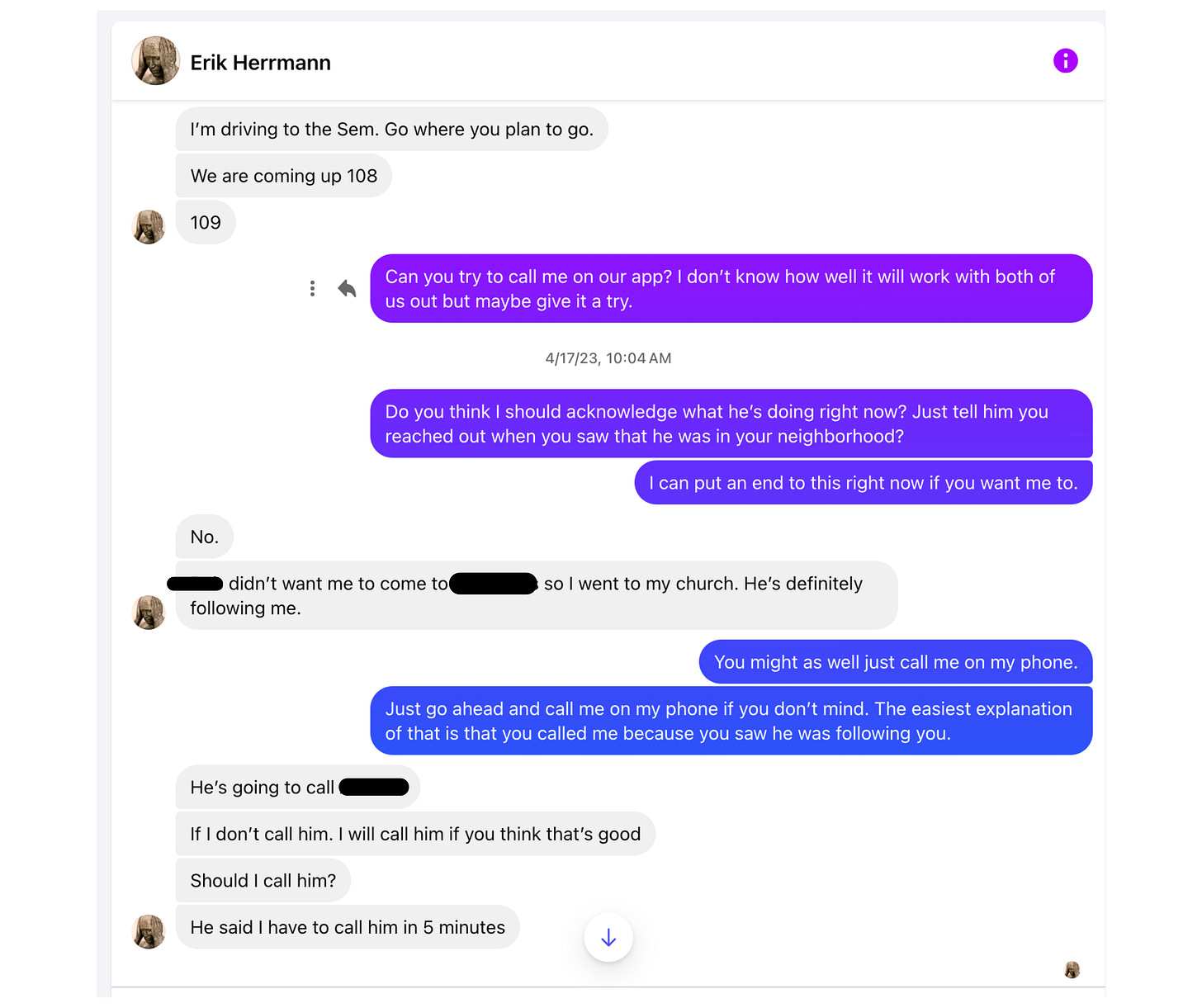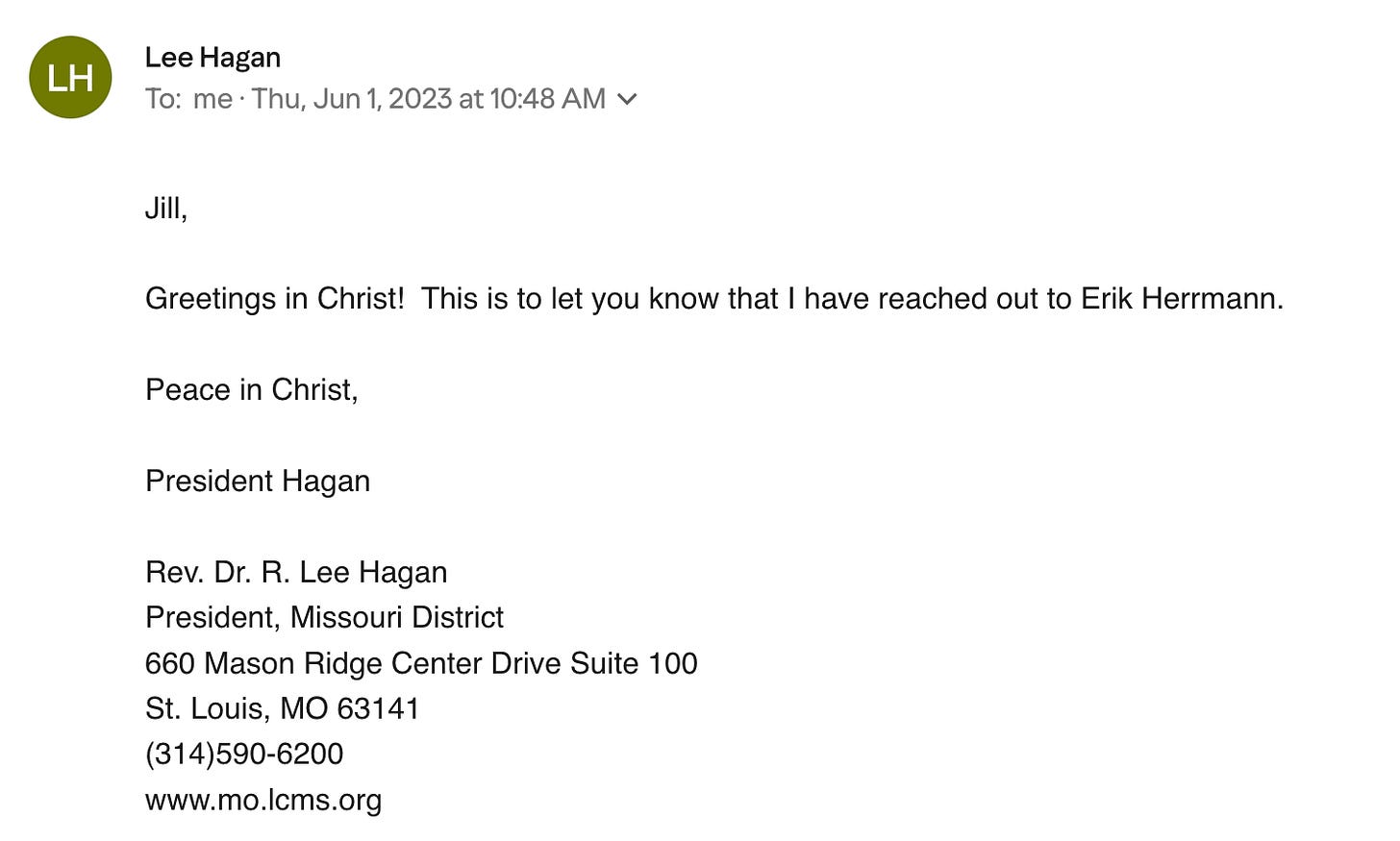Why I Went to President Hagan in 2023: The Story and the Evidence
Every now and then, someone sends me a thoughtful question based on something they’re either reading or not reading here, and I feel obliged to respond with a post. Yesterday, someone asked why I haven’t yet described what happened when I went to talk to President Hagan, as well as why I made that decision in the first place. Great questions. I’ll do my best to piece it all together here.
On April 17, 2023, Erik disappeared. He was leaving his house to come pick me up at a commuter lot near his home when he noticed someone following him. He asked what kind of car my husband drives and what color it was. When I gave him those details in a Facebook message, he told me it was my husband following him. Long story short, my husband ended up trailing him into the city, where he confronted Erik.
My husband’s original plan that day was to confront Erik at work (Concordia Seminary), but after reading my Facebook messages earlier that morning, he learned that Erik was planning to spend the day with me instead. That’s why he was following him—he wanted to see where we were going.
Here are some of those messages:
Erik and my husband did, in fact, meet across the street from Erik’s church. That’s when Erik threw me under the bus, then called me to say, “What am I supposed to do? Give up everything for this?”
It wasn’t until May 17, 2023—one month after that confrontation—that I reached out to President Hagan’s office. What you’ll see below is a series of screenshots from our email correspondence. I’m sharing them to document that I did reach out, that we met, and that President Hagan did follow up with an outcome.
When I received his final email, I assumed Erik had told Dr. Egger the truth about why he’d been called to meet with Hagan and why he was resigning from the seminary and from the LCMS pastoral roster. After the screenshots, I’ll share more about what happened when my husband and I met with President Hagan in person.

Before I go on, I want to say that I have a positive opinion of President Hagan. Though I wish he had offered more clarity when I wrote to him about a month ago, specifically asking for clarification about what happened in his meeting with Erik in 2023, and where my evidence is currently filed, I know he has a job to do, and I believe he did it.
My husband and I met with President Hagan on Wednesday, May 24th, around 5:00 p.m.
The first thing that happened, after a general greeting, was that President Hagan set a red three-ring binder on the table between my husband and me. He sat across from us and asked me to open the binder and follow along as he pointed out the policies and procedures we would follow in that meeting and, if it led to a follow-up investigation, what that would involve.
I understood right away that I would tell him the story, back it up with my evidence, and then he would reach out to Erik. My main concern was that the investigative team not include anyone from Concordia Seminary, St. Louis, because Erik often told me he “had the ear” of several members of leadership there, especially Dr. Egger. Once Hagan assured me that Erik would not be able to influence any of the team members he had already chosen, I proceeded.
The reason I went that day was because I needed someone with authority in the Synod to know what had happened, especially in the event that Erik might slander me to others. I had a specific reason for wanting to protect myself in that way, but I can’t speak about it publicly yet. For now, I’ll simply say this:
I knew Erik for six months. I trusted him completely. I loved him. In the end, I quickly discovered I didn’t know him at all. With that in mind, I realized he was someone I might need to protect myself against. That’s why I went to Hagan.
Here are some things I did not think would happen when I went:
I did not think Erik would lose his position at the seminary or on the LCMS pastoral roster.
I did not think Erik would even know I went to talk to Hagan.
But about ten minutes into the meeting, I realized that in order to protect myself, I was going to have to betray Erik—or at least that’s how it felt at the time. Not only by telling the story, but worse, by sharing the evidence I had to substantiate it.
At the time, I was still in shock. In the month between Erik’s disappearance and the day I sat across the table from Hagan, I was like a zombie. Alive, but not really. My thoughts came in fragments—images, flashes, and emotional stabs that sometimes felt physically real. I don’t share this to invite pity. I share it to give context for the state I was in during that meeting. And to add to that context: my husband had to sit there and listen to the whole story again while he, too, was functioning but not fully present. If I might interject a moment of levity—it felt a bit like The Walking Dead meets Mister Rogers (and I mean that in the kindest way).
During the meeting, I was reading from bulleted notes I had typed out in preparation. I never intended for anyone else to see those notes, but a few days after we left Hagan’s office, he asked me to provide a signed statement of my accusation of sexual misconduct against Erik. He said I didn’t need to write something new—the notes I had brought would suffice, as long as I signed them and submitted them in a sealed envelope by May 30, 2023.
At the end of the meeting, after I agreed to share the HTML download of our Facebook messages (the evidence), President Hagan said, “I just want you to be prepared. If there is even so much as an attestation of affection among these pages, there is only one way this can go.” I took this to mean that Erik would be subject to an investigation and lose his position.
Inside, I was devastated and relieved all at once. Nothing is ever just one thing—especially when you’ve entangled yourself in the sin of adultery. The relationship was real, the emotions were real, and the investment was real. Regardless of the illegitimacy of the connection itself, the disentanglement felt like trying to separate two pieces of paper that had been glued together. There was nothing clean about it. There were tears everywhere. And tears. On my end, anyway.
It wasn’t until February 2025, when I learned Erik was teaching at Christ School of Theology under the headship of the Institute of Lutheran Theology, that I began to wonder: what did happen in Hagan’s office in 2023?
I’ve learned more in the past two months than I did in the eighteen months that came before. But that’s just a byproduct of sharing this story. The bigger outcome—the one I didn’t expect—is that I’m no longer holding any of Erik’s secrets. I’m no longer carrying any weight that belongs to him.
I didn’t go to President Hagan to take Erik down. I went because I no longer felt safe being the only person who knew what had happened. I didn’t know what Hagan would do with the information. I didn’t expect much of anything. But I knew I had to put the truth somewhere outside of myself.
That meeting, as awkward, necessary, and painful as it was, marked the beginning of a true separation. It was the moment my loyalty to Erik was placed in direct conflict with the truth. I knew that by speaking honestly and offering evidence, I was no longer protecting him. I was choosing to protect myself and my family instead. It wasn’t easy, and it wasn’t clean, but it was a step toward my own accountability.
Now, as I tell the full story, I’m no longer protecting the silence either.
A Note to Anyone Feeling Fearful of Going to Your District President
For a long time, I held on to Erik’s word that he would come back for me. He didn’t say it in the final moments, but he had said it several times in person and at least twice in writing. He promised that if anyone ever found out, he would disappear—maybe for a long time—but he would come back.
I see now that this wasn’t hope. It was control.
That kind of promise, meant to preserve your silence, loyalty, and emotional attachment while giving the other person an escape route, is a classic form of emotional tethering. In more clinical or trauma-informed terms, you could describe it as:
A tethering promise: Keeps you emotionally tied even in their absence.
A trauma bond reinforcement: Deepens the psychological grip of the relationship under stress or abandonment.
A controlled exit narrative: Allows them to disappear without taking real accountability, while ensuring you don’t speak up.
A loyalty lock: A term used in survivor communities to describe a psychological “lock” formed by future promises.
A silent binding agreement: An unspoken vow designed to bind you emotionally without consequence to them.
A ghost promise: One that vanishes with the person but still haunts your decision-making and self-worth.
I believed Erik’s promise. Now I understand it meant only this: stay quiet, stay loyal, stay waiting.
If you’ve been given a promise like this, I hope you’ll question what it’s really asking of you and what it might be costing you to believe it.













